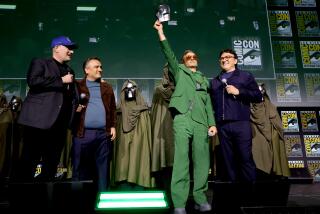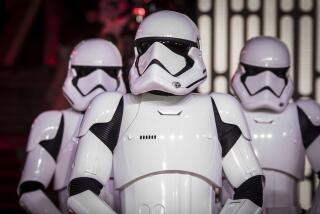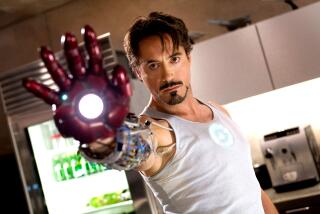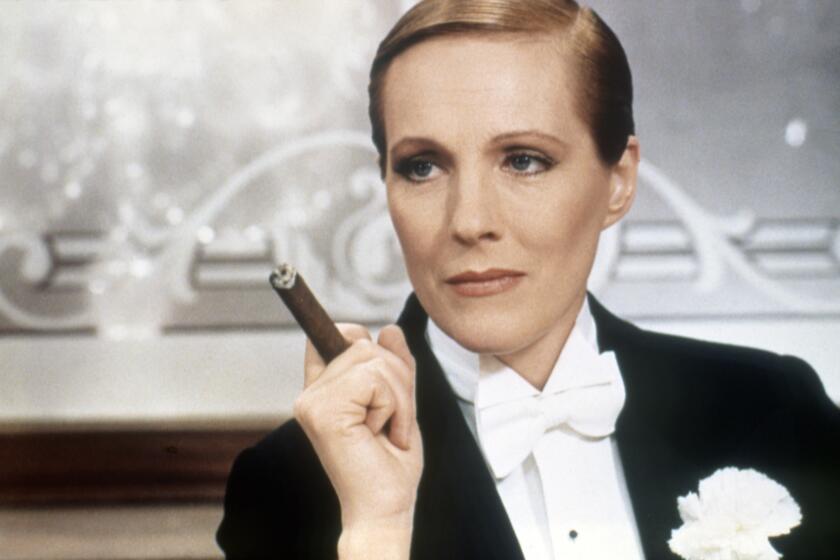‘Avengers: Age of Ultron’: Solid, if not marvelous, early reviews say
Iron Man, Captain America, Thor and the gang face numerous threats in the summer smackdown “Avengers: Age of Ultron,” including a megalomaniacal android, a pair of superpowered twins -- and perhaps most of all, franchise fatigue.
Headlined by “Iron Man” star Robert Downey Jr. and written and directed by “Avengers” alum Joss Whedon, “Ultron” comes as the 11th installment in Marvel’s shared cinematic universe. Early reviews of the movie, which opens May 1, indicate that it’s entertaining and well-executed but also feels a bit obligatory.
Variety’s Scott Foundas calls “Ultron” a “a super-sized spandex soap opera that’s heavy on catastrophic action but surprisingly light on its feet, and rich in the human-scale emotion that can cut even a raging Hulk down to size.”
Compared to its predecessor, Foundas says, “the new movie is a sleeker, faster, funnier piece of work -- the sort of sequel (like ‘Star Trek II: The Wrath of Khan,’ ‘Superman II’ and ‘Indiana Jones and the Temple of Doom’ before it) that shrugs off the self-seriousness of its predecessor and fully embraces its inner Saturday-morning serial.”
The Hollywood Reporter’s Todd McCarthy is a bit more critical. He writes: “The powers of Marvel’s all-star superheroes go a bit wobbly in ‘Avengers: Age of Ultron.’ ... To be sure, series junkies will get their fix from the sheer massiveness of the exploits, but at least two of the big action scenes are lackluster, while the climax and resolution could have been worked out in more complex, less rote ways.”
McCarthy adds that “Whedon’s efforts to invest the heroes with a degree of unsurety and vulnerability comes off as half-baked, as such an effort can only go so far due to the nature of the material.” Meanwhile, “some of the characters are left in a kind of dramatic no man’s land.”
The Wrap’s Alonso Duralde writes: “Sequel fatigue for the second chapter of any cinematic saga is generally a given, but ‘Avengers: Age of Ultron’ sags under the weight of not only its 10 Marvel Cinematic Universe predecessors, but also the dozen or so already-announced follow-ups.”
Duralde says that in the first “Avengers,” Whedon “showed a facility for bringing modern comic books to the screen with equal parts snappy banter and awe-inspiring mayhem, and while those gifts remain evident in ‘Ultron,’ you can feel the functionality of Disney’s Marvel movies overwhelming the fun. This latest film isn’t a cheat, but neither is it a delight.”
Similarly, Forbes’ Scott Mendelson says: “‘Avengers: Age of Ultron’ plays like an obligation, a box to be checked off on a list before all parties move on to the things they really want to do. The story is shockingly inconsequential, both in terms of the overall Marvel cinematic universe and even in terms of stand-alone ‘Avengers’ movies.”
He continues: “It hits all the marks, providing big-scale action and the required witty banter, but there is an air of artifice and irrelevance to the whole affair. The situations that occur in this fantastical sequel are theoretically world-changing and should be game-changing to the Marvel universe, yet the implications are either ignored or tossed off.”
The Guardian’s Peter Bradshaw, however, is content to go along for the ride. Regarding the recent glut of superhero movies, he says, “there’s certainly no problem if they’re as exuberant, funny, silly and crazily exhilarating as [‘Ultron’], which is a pure aspartame rush.” The whole thing is “operatically mad,” Bradshaw says, “and the city-destroying final confrontation is becoming a bit familiar, but Whedon carries it off with such joy and even a kind of evangelism.”
Then again, given the massive success of the “Avengers” franchise, he may be preaching to the converted.
Follow @ogettell on Twitter for movie news.
More to Read
Only good movies
Get the Indie Focus newsletter, Mark Olsen's weekly guide to the world of cinema.
You may occasionally receive promotional content from the Los Angeles Times.










